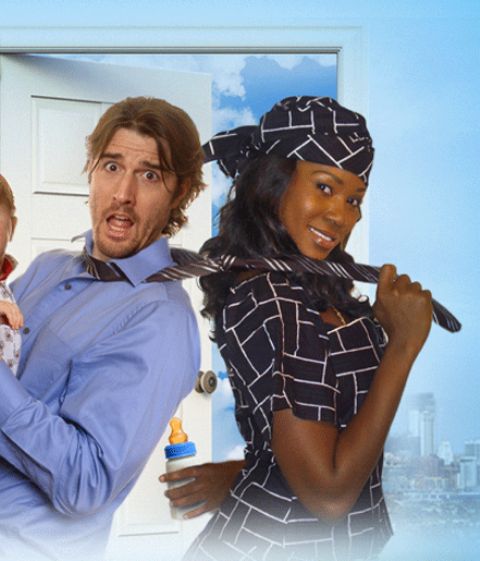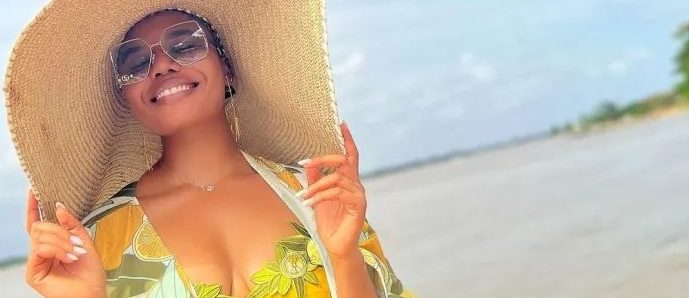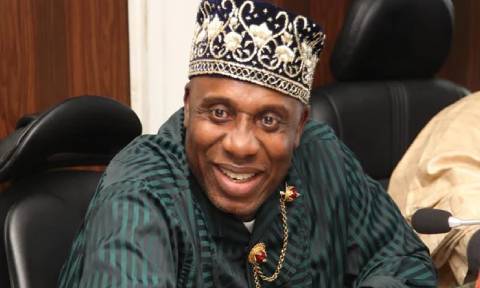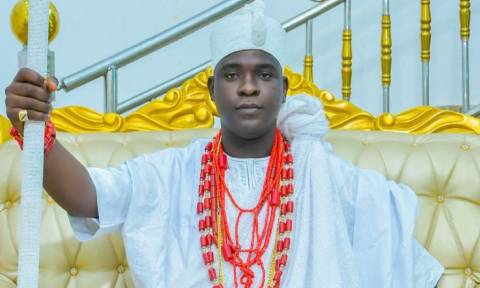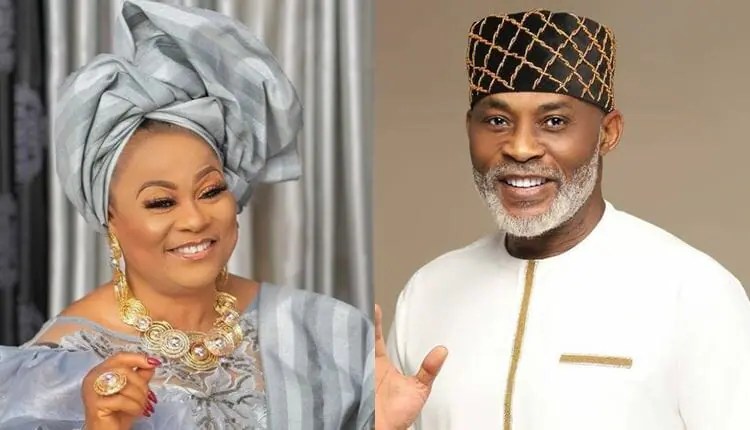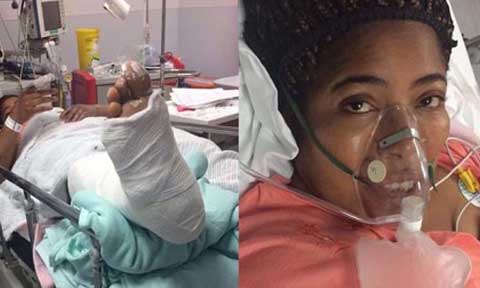
*Says ‘Nollywood insults us by saying Nigerian film industry started in 1992’
Wale Adenuga Snr., the executive producer of Super Story, Papa Ajasco, Binta & Friends television series is a very rare and deep personality. He has been in the creative world for several decades now and still waxing stronger. Adenuga, who created the magazine, Ikebe Super in 1976, has taken humour into the home and life of many people. When he agreed to our request for an interview in his place recently, the session lasted over three hours. It was punctuated with humour, great laughter and insight into the life of a man who describes himself as a pencil in the hand of God. Excerpts:
HOW did you come into the arts? Tell us about your background.
I was born with it in me. And I started manifesting it right from childhood. I was born like a normal human being. But at about the age of eight, I discovered certain talents in me. I discovered I could draw without being taught fine arts. I could play musical instruments. I could also act. So, these were the elements of talents visible in me when I was even in primary school. So, on getting to secondary school, I decided to continue in the direction because the talents kept on growing inside me. Right from Form Four, in 1965 or so, I formed a musical group at Ibadan City Academy. And I was also the head of the drama group. Besides, I was still drawing very well.
So, these three talents kept growing. Even at Kings College, Lagos where I did my Higher School Certificate (HSC), in 1968 and 1969, I formed a juju musical group. I was also acting as well as drawing in the school. It went on like that until I entered the University of Lagos where I was drawing.
I dropped music because there was no opportunity to prove my mettle in music and drama. But then, I was drawing more than ever before. So much so that I soon became the chief cartoonist of the campus magazine. I was drawing so well and by the time I graduated in 1974, having published the campus magazine, a cartoon magazine, for about three years, I decided to continue drawing and publishing such comic materials even after graduation.
During my National Youth Service in 1974/75, in the then Bendel State, I decided to collect materials for my cartoon magazine which I launched in December 1976. It was called Ikebe Super. For the first three years, I was doing everything alone. It was a one-man company. I was drawing everything on my dinning table. I would later go to the printer and print before getting them to the distributors around Ibadan and Ile-Ife until, a year later, it extended to Lagos and beyond. Soon, it became a national thing. So that’s how I came into the arts. I did publishing for about twenty years before venturing into film production. In 1982, I came out with a film called Papa Ajasco.
It was Nigeria’s first comedy film in English. Before then, we had had Yoruba comedy by dramatists such as Adeyemi Afolayan (Ade Love), I-sho Pepper (Ishola Ogunsola), Hubert Ogunde, Baba Sala (Moses Adejumo). But the first comedy film in English came from me. It was Papa Ajasco. And it was taken throughout Nigeria, West Africa, and Europe. It did very well. In 1995, I came out with a home video called Binta My Daughter. Papa Ajasco film came out of the Ikebe Super magazine characters while Binta My Daughter came out of the characters of Binta Magazine. In 1997, we started having Papa Ajasco comedy series on television. In 2000, Super Story television series started. After a while, we added Binta and Friends television series. These are the things we have been doing ever since. And they have been waxing stronger and stronger.
What challenges have you been facing because making money from the arts in this country is difficult?
It’s difficult. But, you see, I knew from the onset that it was a long distance journey and you needed a lot of stamina. And I knew I must possess a lot of patience and stamina of the Fulani man that reared cattle on foot from Maiduguri in the extreme north-eastern part of Nigeria to the southern city of Lagos. That’s the kind of stamina. That’s why a lot of people are running away from television production in Nigeria. It’s not something that you reap profit from in six months and I was prepared for it. I knew it would pay off. Whenever I set my mind on a project, I always focus on the fruits and not the problems.
If I believe in a cause, I must do it tenaciously. I know I will just suffer for one or two years. From the third year, I will start reaping fruits. It’s not easy to put a programme on television in Nigeria. To get adverts is very difficult. And without adverts, you cannot keep the programme going. We were there and, from one advert to two, to three, to the stage that we now reject adverts. To God be the glory. We have passed through the stage of painful circumcision. I think we are only starting to consolidate now.
Cast your mind back to when you started, look at the home front. I am not talking about your wife now —I mean the extended family. Were you given any support at all, because our society doesn’t reckon with artistes or someone sketching cartoons or creating stories?
When you talk of support, then give it to madam — that’s my wife. For instance, when I started Ikebe Super, we got married in 1975 and I started the magazine in 1976, a year after marriage. You know its not easy starting a business. When you start a business, the first year is usually difficult. And except you have an understanding wife or spouse, forget it. If you don’t have an understanding wife, the engine of your head will knock.
This is because by the time you go outside and meet fatigue and you come back home to meet boiling water, you will collapse. But this woman— my wife— has been great. From day one, she was all out to support my business. Even when we were shooting models for the magazine, she was giving us her clothes. In fact, when we began the distribution of the magazine, she was an assistant lecturer at University of Ife. When it was time for her to take a car loan, she used the money to buy a commercial bus to help in the distribution of the magazine to show you that, right from day one, she had been working, not behind, but working beside me. She has been a valuable partner, up till today and till tomorrow.
Some women have knocked the engines of some writers and actors…
In fact, I am lucky. I think I am lucky. I think that I was able to pick a woman that was and is compatible with my ideals. You know there must be compatibility. One should marry his level. That is, someone that is compatible with your ideals, that has the same value system. Value system is very important in selecting a partner. If you look at me, I won’t say I am an introvert, but I do not go out. I don’t socialize. I don’t waste my time on irrelevant things. I have come to realize that time is very important and we don’t have much of it. In a day, how many hours do we really have to work? By the time we eat three times a day, sleep, receive visitors, discuss our country, how many hours do we have to work? So, I guard my time jealously. I don’t waste it. I have the same kind of value system in my wife. She doesn’t waste money buying things. When we were on the campus courting, if I suggest we should go to an eatery, she would ask: ‘Why do you want to waste your money? Why don’t we go to a buka and eat fresh fish or frozen fish’. We have the same value system.
How did you meet her?
Well, we were in the same faculty at the University of Lagos. We were in the same department, Business Administration. And we had some courses together. We met as students. We started as friends until the relationship graduated into lovers. So, we found ourselves compatible and we got married.
Let’s go back to Ikebe Super, Papa Ajasco, etc. How did you create your characters? Was Papa Ajasco a vision from heaven?
I had some stint in cartoon drawing, as I told you when I was at the University of Lagos campus magazine. I was already groomed in this area. So, by the time I wanted to start the Ikebe Super magazine, I wanted a magazine that would cut across all age groups. I then said, ‘Let me create a young character that will interest young ones.’
I created Ajasco. Each of the characters represents a different age group. I created Boy Alinco to represent teenagers, who probably lived in America. I said again, ‘Let me create a young bubbling girl between the ages of 18 to 23,’ then I created Miss Pepeye. I remember the hair style I created on her head flowing down the forehead (he begins to draw the characters on a piece of paper to demonstrate to the reporter).
Then I said, ‘I needed a man— around 40 years, who with his wife will be part of the story.’ I created Pa Ajasco — as a bald headed man. Then Mama Ajasco complemented him. I needed an old man to exhibit stupidity. I created Pa James (continues to sketch Pa James). There’s no way you will pick up the magazine that you will not see your own age group. It was a strategy.
And this has become a successful strategy?
I thank God.
In recent times, you do all kinds of strange stories, mystery stories, Odd World, This Life, etc. Recently, you aired a play called Nnenna and it caught the attention of everyone. What are the things that inspire you?
Nnenna is my own adaptation of an American film called Ghosts. When I watched that film, I said I should have an African adaptation of the film. Our story is quite different from their own. But there are certain elements. You know we have our own way of writing our stories in Africa. There must be love, moral issues, reward for evil and good.
So, I put all these in the story. I created a story that the girl must be the eyes of the father and after death will continue to protect the interest of the father. Nnenna means, Mother of father. It’s like the girl is the father’s mother to protect the interest of the father. That’s how we got the name. Nne means mother. Nna means father. The girl is like the eyes and protector of the father. We got the whole thing together, then had a script conference and came out with a thriller.
Not a true life story. We brought some myths, beliefs. Again, I remember the story we called Mr. Lecturer. It shook the country. The story was about a girl and a man must sleep with her before she leaves the campus. The girl said she had something to explain to the man and the man said no, ‘Let’s do what we have to do.’ He was impatient, and he said she should explain after the sex. The girl said it’s ok. And they had sex.
The man later asked her what it was and the girl said, “Well, it’s too late but I have to tell you. What I wanted to tell you was that since I became a teenager, I observed that all the men that have been having sex with me usually die on the seventh day. I wanted to tell you but you didn’t allow me and I was thinking of going home after the exams to do some cleansing. But now that you have done it; I don’t know what to do.” That was where crisis and wahala started in the play. That story shook the country. The man started running from one place to another. They went to the lady’s village, everywhere. It was a fantastic story. Such stories come with morals.
Stories with morals
Our stories always come with morals and that’s what the Africans love. The Western films don’t emphasis such things. What they sometimes do is to show the new technology associated with a new camera. But here in Africa, your story must have a meaning, a beginning, and the end that will teach the children or people something. For example, our Super Story is such that parents will call their children to come and watch and learn some lessons. Parents will even call their children to watch what they have been telling them and they never listened.
Don’t you see yourself as a pastor preaching to people even though you are not on the pulpit?
Or an evangelist. I always tell people that all creative people are prophets, be it in music, script writing, production, etc. We have the third eye with which we see things others cannot see. Yes, we are prophets whether we like it or not. We are like Moses that went up the hill to collect the testament. That’s what we are doing, that’s why I call myself the pencil. The pencil has no brain. The brain of the pencil is in the head of the person holding it. The hammer is that of the carpenter holding it. So, the hammer hits your hand, you don’t hit the hammer, you’ll hit the carpenter. I am just the pencil in His hand and He will continue to use me well. We thank God.
When you were on campus and you were doing cartoon, didn’t you get into trouble with your lecturers?
Not lecturers really. We were doing the magazine on students. We called it bugging magazine. It was meant to correct students. We were writing and drawing to correct people caught in unruly behaviour. Like those shunting the queue or those eating carelessly. We drew them and wrote on them. Then, a few lecturers too who were involved in sexual harassment, we wrote their stories and drew their cartoons. Why I was popular was because if I drew your face and your story, people would know this is Tunde. So, I had that luck. We focused more on students.
I was a cartoonist of Cobra magazine at University of Ife?
(Laughs) Cobra! I know Cobra. Williams, now a professor, was one of them. You dedicated Nnenna to great people in the arts – Duro Ladipo, Hubert Ogunde, Oliver De Coque, Orlando Owoh, etc. They laid the foundation of what we are doing today. Like Ogunde, we had Ogunde films…he laid the foundation. This has brought us to this idea of Nollywood. I think Nollywood is a concept that doesn’t take my fancy because the proponents of Nollywood are trying to re-write history. Because what we learnt in the philosophy of mathematics is a part cannot be equal to a whole.
Nollywood cannot represent Nigerian film industry. Nollywood is that part of our film history that started in 1992. And if you look at Nollywood stakeholders, they are always saying that the industry started in 1992. They are referring to the Nigerian home video industry that started in 1992. When you talk of the film itself, what the white man calls film; it started in Nigeria in the 1960s/70s. Ogunde shot his films in the 70s. Baba Sala had shot Orun Mooru too, Ade Love too had shot his films on celluloid, Eddie Ugboma, etc
I know Wole Soyinka had also shot Kongi’s Harvest in 1970 and Blues for the Prodigal ..
Yes, Wole Soyinka had shot Kongi’s Harvest…These are films. So, you cannot say that the Nigerian film industry started from1992. So, there are some problems in that area. Hollywood dates back to day one that an American made a film.
Why is our own different? I think it’s due to the lack of the sense of history in the country.
People should correct the people trying to re-write history. Because if I have seen some of our colleagues on television several times in and out of the country saying that Nigerian film industry started in 1992, I made Papa Ajasco film in 1982 where I used people like Christy Essien. It was made in 1982. It’s an insult to say that the Nigerian film industry started in 1992 and I saw Amaka Igwe on the television saying that. It is sad.
I even met Dr. Ola Balogun, one of the pioneers in the film industry, last year.
Yes. When I wanted to shoot my film in 1982, Ola Balogun was the first person I went to. Ola Balogun produced Ajani Ogun, Muzik Man, etc, so, how can you say the film industry started in 1992? It’s an insult to all those who contributed. There was Bisi, Daughter of the River.
I remember Jab Adu (Bassey Okon in Village Headmaster) starred there…
Yes, Jab Adu was there. I mean we should open up this issue and we should debate it. That was why I dedicated Nnenna to Ogunde and all those who laid the foundation of what we are doing today.
Were you able to meet any of those icons when they were alive? Ogunde, Duro Ladipo, etc.
Yes, we met. But the person God used to introduce me to film was Ade Love. It was a spiritual thing. And I will tell you what happened. I had been publishing since 1976. By 1982, the magazine had become very popular in the country and the characters in the magazine had become well know. So, I wrote a script, got some money together and selected people to use and we embarked on production.
So, during the production period, I discovered some things. I wanted to work with the Nigerian Film Corporation which promised a lot of assistance. Based on their promise, we planned something big. But we discovered that money was not forth coming. We got disillusioned; so, I just told the cast that they should go home because we had to start planning all over again. I disbanded the production crew. I decided to face my publishing for a while until the coast was clear for film production. There was a church along our street. One of the pastors there came to me and said that he saw a vision that I embarked on something and I got frustrated over it.
He said God asked him to tell me that that thing I embarked on was a special assignment from Him and that I failed because I surrounded myself with the wrong people. He said that God said very soon, He will show me the way and that the thing will be done. I said; it’s okay. It was a Sunday. The pastor then left.
Four days after that, I was at my place at Ejigbo, Adewale Adenuga Street. It was a Thursday. My security men called me and informed me that I had a visitor. I asked, who? They said Ade Love. I had never met him in my life. He said he was in London the previous Sunday when some people were telling him that I wanted to make a film but that I had surrounded myself with wrong people. And that he had come to show me how films are made, that it was not difficult; it was the same words that the pastor used the previous Sunday that he used.
He said he wanted to shoot the film – Taxi Driver – and he had taken some blocks of flats at Orilowo Ejigbo there, very close to me and that I should come and see how films are made the following Monday. So, that Monday, I went there. I saw him directing his own movie and, within few weeks, he made the film. I was able to sign on some of the artistes he used. I made my film in the same flat he used to shoot his own film. God used him to open my eyes in film making.
